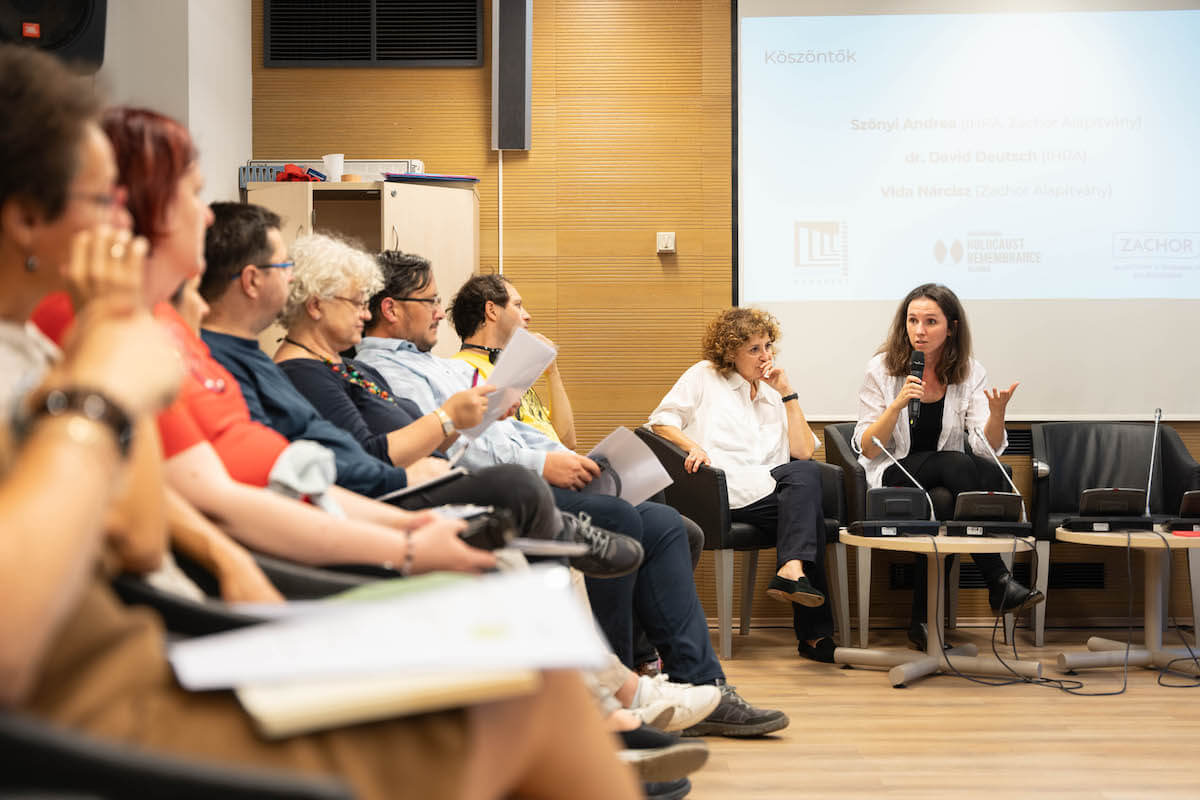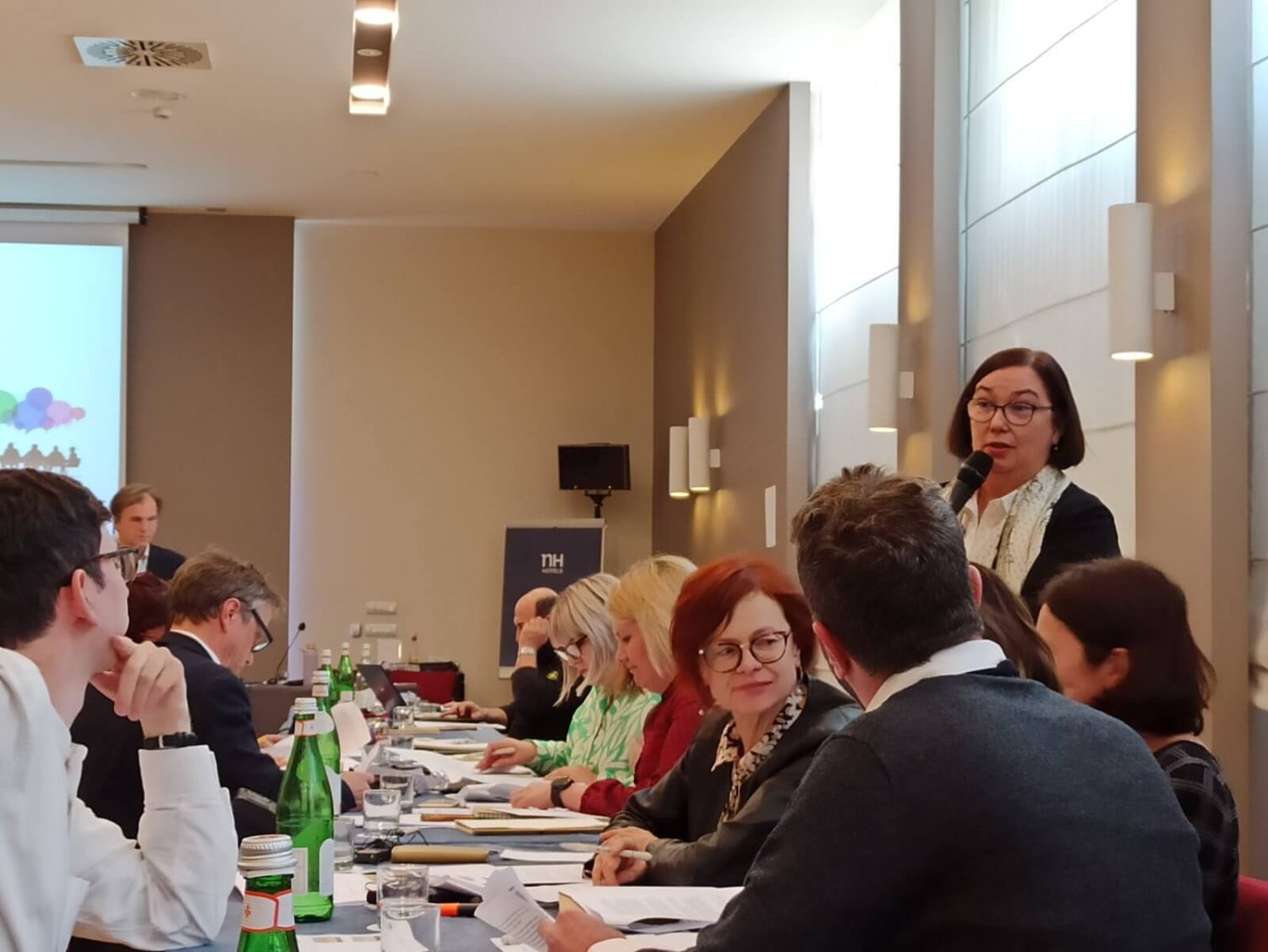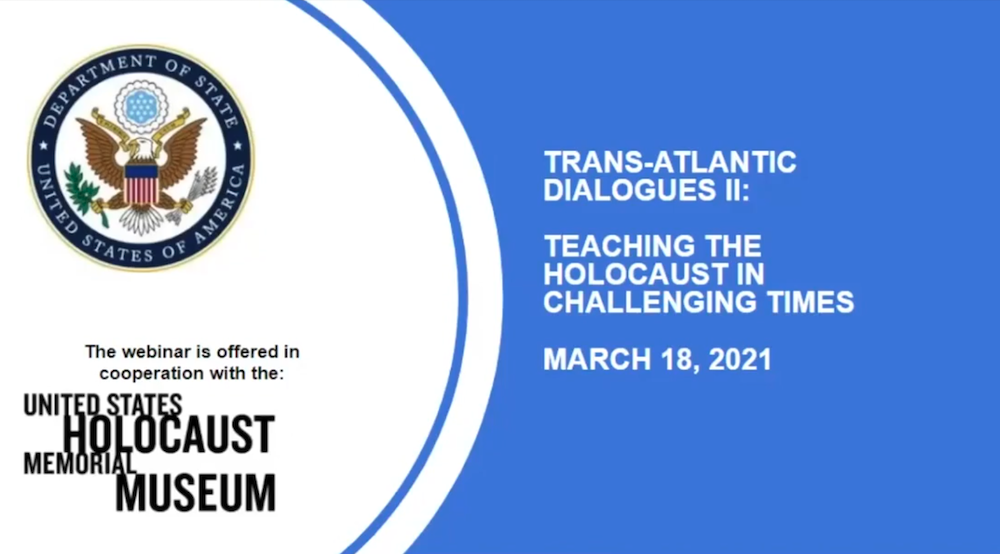


Equipping policymakers and educators to tackle Holocaust distortion
In a small room in the Holocaust Memorial Centre in central Budapest, a group of teachers from across Hungary are busy discussing examples of Holocaust distortion that could surface within their classrooms. Many have experienced similar situations first hand. All are passionate about tackling distortion.
The workshop underway is the Holocaust Distortion Capacity Building Training Programme, hosted by the International Holocaust Remembrance Alliance, in partnership with UNESCO and the Zachor Foundation. Its purpose is to equip policymakers and educators with the skills, knowledge and tools they need to identify and respond to this important social phenomenon.
There is an occasional chuckle, a voice raised as the conversation becomes more forthright, the click of pens and fingers on keyboards. At first, the question they are pondering appears simple – how do they identify Holocaust distortion in schools? – but as the day progresses, it’s clear the answer is complex.
The need to tackle Holocaust distortion is urgent
Disinformation, fake news, propaganda and hate speech is one of the biggest challenges facing societies all over the world. Within this, false or misleading information about the Holocaust threatens its memory and understanding, spreads antisemitic prejudices and stereotypes and glorify Nazi perpetrators and ideologies. In turn, the perpetuation of anti-science and anti-rational viewpoints increase the likelihood of people rejecting human rights principles and becoming more susceptible to believing antisemitic tropes.
“Even though the Holocaust is one of the most researched historical events, established facts about it are still being distorted. In this context, more effective means are needed to ensure a correct understanding of the Holocaust and respect for human dignity, especially as we enter a new era in which the last Holocaust survivors and direct witnesses are passing away”, says Oana Nestian-Sandu, director of international programs at TOLI who helped design the programme in partnership with the IHRA. “Education has a key role to play by fostering critical thinking, promoting accurate historical knowledge, cultivating empathy, strengthening historical consciousness and empowering young people to become active citizens.”
A safe space for discussion and learning
It is a diverse set of activities that have been packed into the two-day programme, which was split between two groups: policymakers and educators. The aim is to ensure the development of knowledge and critical understanding, attitudes, skills and values – with tasks designed in such a way to help participants understand Holocaust distortion and its potential impact on our societies, as well as to contribute to preventing and countering it, while also enabling participants to overcome cognitive dissonance and challenge previously held views.
Speaking at the session for policymakers is Moritz Wein from the Austrian Federal Ministry of Education, Science and Research who is here to provide an international perspective on the challenge of Holocaust distortion.
“It’s not always obvious why Holocaust distortion is a topic that needs government attention. But if we understand it as a form of hate speech and antisemitism, it becomes much more obvious. It is a responsibility of the government to counter it because it is an incitement to hate and can lead to violence and very dangerous actions,” says Wein during his opening speech, reminding delegates that 53% of Europeans see Holocaust denial as being a problem in their country and that 62% of Jews have seen or heard non-Jewish people suggesting the Holocaust is a myth or exaggerated.
“The European Commission is determined with its EU Strategy on combating antisemitism and fostering Jewish life to significantly step up to fight against antisemitism and to make Europe a safe and prosperous place for our Jewish community”, he says. “The European Union also wants to act as a global leader in the fight against antisemitism and in the global fight for human rights and against hateful speech.”
To this end, explains Wein, in 2021, the European Union developed its first ever strategy to combat antisemitism. Meanwhile, all European Union countries must enable and protect free speech, but also protect minorities and punish incitement to hate speech.
“In Austria we are very fortunate that we have a very strong legal framework to counter hateful speech and to counter specifically Holocaust denial and Holocaust. Called the Prohibition Act, it is a call to all Austrian government officials, to law enforcement agents and even to all Austrian citizens to counter any form of Nazi ideology. According to the Prohibition Act, denying the Holocaust or glorifying it, or distorting in some cases, the historical facts of the Holocaust can lead to imprisonment of one to 10 years,” he explains.
A meaningful pedagogical flow
“Holocaust distortion is a very dangerous form of antisemitism. It’s hard to track, hard to unpack and recognize, and if you don’t know about its existence and how to identify it, you cannot know how to counter it.”
This is why the training is so important, according to Andrea Szonyi, director of the Zachor Foundation for Social Remembrance, the local partner organization of the IHRA within this project. To this end, the programme uses video, survivor testimony, case study, group discussion and presentations to help participants understand Holocaust distortion, the impact on individuals, the Jewish community and wider society, and ways in which to prevent and counter it that are mindful of human rights such as freedom of expression. Importantly, it also provides tools to help policymakers and educators develop an action plan for them and their colleagues.
The educators in the afternoon session talk through how and why Holocaust distortion can manifest in schools. They refer to populist politics, pupils being receptive to extreme ideologies they’ve encountered online, parental attitudes and a lack of understanding among fellow teachers. The solutions suggested are varied – no one child or situation is the same, they say – and range from supporting colleagues with toolkits and advice through to using survivor testimony as a positive way to challenge and change views.
“There is a huge amount of stupidity storming at you and the virtual world makes it easier to be part of a community and find neo-Nazi friends. For isolated frustrated kids, it’s very easy to join these communities,” says one, adding that it is important for teachers to show students who may be vulnerable to extreme ideologies how to be “be strong in other areas”.
“When I was a child, one of my teachers invited in a grandparent to share experiences of World War Two. It was a defining event for me. We stopped laughing and started thinking”, reflects another, emphasising how lived experience can bring a story alive for students and make them receptive to the real-world consequences of Holocaust distortion.
Creating a safe and productive educational environment was also a priority according to the teachers in the room: “We must teach the skill of asking questions and create an environment of trust so they can formulate question without fear and shame and not to be ashamed that they lack knowledge,” says one, a message that was reiterated by others throughout the day.
It was certainly an environment of trust that had been created during this particular workshop. The conversation was cooperative and productive, and the room was rich with potential.
“Acknowledging the hard truth about our past is very challenging, but I don’t think there is anything that we could be prouder of than searching for the truth, facing it with dignity, and learning from it, so we can do better in the future,” says Oana Nestian-Sandu as the event comes to a close. “I think we all have a responsibility to counter Holocaust distortion and I think we have to act responsibly. Acting responsibly in my opinion means not pretending to have expertise in areas that we do not have and finding ways to collaborate among different institutions, organizations, experts of Holocaust education, schools, etc. This is such a complex subject that it cannot be left to just a few entities to address it properly.”
The Budapest workshop was part of a wider programme of activity to help build the skills, knowledge and capacity among policymakers and educators. They accompany resources such as the IHRA Toolkit Against Holocaust Distortion, which is designed to help policy and decision-makers be ambassadors for change within their institutions, governments and communities, and the #ProtecttheFacts campaign, which helps people counter distortion.



